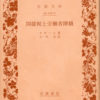
海洋プラスチックとは何か、そもそもプラスチックとは何かから書かれており、わかりやすい。
海洋プラスチックの自然環境に与える影響も、人体に与える影響もまだ研究途上だ。(ただ、溶け出した添加物質が影響を与えることは明らかだ。)
著者は、研究結果を易しく解説しているだけで、その価値判断には慎重だ。「科学の世界では、かならず手法と結果がペアになって結論が語られる。マスメディアは、ときに手法や前提条件、そのニュースの背景を詳細に語らずに結果だけを報じるので、科学の結果と社会の受けとり方にずれがでることがある。」「科学にも答えられないことがある。・・・それは人の価値観や判断が関係する領域だ。」「科学的に判断するというのは、科学者が判断することではない。科学の成果を使って、わたしたちが判断するということだ。」
そのとおりである。しかし、わたしたちが判断するためには、その材料が必要であるが、今のマスコミは価値判断をした上で報道をしている。それが、政権や財界の意向に沿うものであることは周知の事実だ。それを「コストとのバランス」と言ってしまっては元も子もない。今の新型コロナウィルスも「経済と感染防止のバランス」と報道されているが、果たして科学的根拠に基づいた判断を政府は行っているのだろうか。マスコミは科学的事実に基づいて報道しているのだろうか。
疑問は募るばかりである。
⟨impressions⟩
It is easy to understand because it is written about what marine plastic is and what plastic is.
The effects of marine plastics on the natural environment and the human body are still under study. (However, it is clear that the melted additive substance has an effect.)
The author simply explains the research results and is careful in judging the value. "In the world of science, conclusions are always paired with methods and results. Mass media sometimes only give results without giving details about methods, assumptions and the background of the news. There is a gap in the way society receives it." "Sometimes science can not answer. It is an area where human values and judgments are related." "Scientific judgment Is not what scientists judge, we use the results of science to make judgments."
That's right. However, in order for us to make judgments, we need the material, but the current media reports after making value judgments. It is a well-known fact that it is in line with the intentions of the administration and business circles. If you call it "balance with cost", there is no origin or child. The current coronavirus is also reported as "a balance between economics and infection control," but is the government making decisions based on scientific grounds? Is the media reporting based on scientific facts?
Questions are only raised.
It is easy to understand because it is written about what marine plastic is and what plastic is.
The effects of marine plastics on the natural environment and the human body are still under study. (However, it is clear that the melted additive substance has an effect.)
The author simply explains the research results and is careful in judging the value. "In the world of science, conclusions are always paired with methods and results. Mass media sometimes only give results without giving details about methods, assumptions and the background of the news. There is a gap in the way society receives it." "Sometimes science can not answer. It is an area where human values and judgments are related." "Scientific judgment Is not what scientists judge, we use the results of science to make judgments."
That's right. However, in order for us to make judgments, we need the material, but the current media reports after making value judgments. It is a well-known fact that it is in line with the intentions of the administration and business circles. If you call it "balance with cost", there is no origin or child. The current coronavirus is also reported as "a balance between economics and infection control," but is the government making decisions based on scientific grounds? Is the media reporting based on scientific facts?
Questions are only raised.
[出演者(プロフィール)]
保坂 直紀:1959年、東京都生まれ。東京大学大学院新領域創成科学研究科/大気海洋研究所特任教授特任教授。サイエンスライター。東京大学理学部卒業。同大大学院で海洋物理学を専攻。博士課程を中退し、1985年、読売新聞社入社。在職中、科学報道の研究により、2010年に東京工業大学で博士(学術)を取得。2013年、同社退社。著書に『クジラのおなかからプラスチック』『海のプラスチックごみ 調べ大事典』(旬報社)、『謎解き・海洋と大気の物理』『謎解き・津波と波浪の物理』(ともに講談社ブルーバックス)ほか。
プラスチックごみによる海洋汚染や生き物の被害が世界中で報告されるなか、日本でも2020年7月からレジ袋が有料化される。マイバッグを持つのはいいが、それは本当に意味があるのか。問題を追い続けるサイエンスライターが、永遠のごみの現状を報告し、納得感のある向き合い方を提示する。
(目次)
はじめに ~このまま汚れた海でいいのだろうか
第一章 世界の海はプラスチックごみだらけ
第二章 プラスチックは地球の異物
第三章 マイクロプラスチックを生き物が食べる
第四章 わたしたち一人ひとりの力は小さいのか?
おわりに 〜わたしたちは、やればきっとできる
(目次)
はじめに ~このまま汚れた海でいいのだろうか
第一章 世界の海はプラスチックごみだらけ
第二章 プラスチックは地球の異物
第三章 マイクロプラスチックを生き物が食べる
第四章 わたしたち一人ひとりの力は小さいのか?
おわりに 〜わたしたちは、やればきっとできる
 [拡大]
[拡大] [ISBN-13: 978-4040823430]


